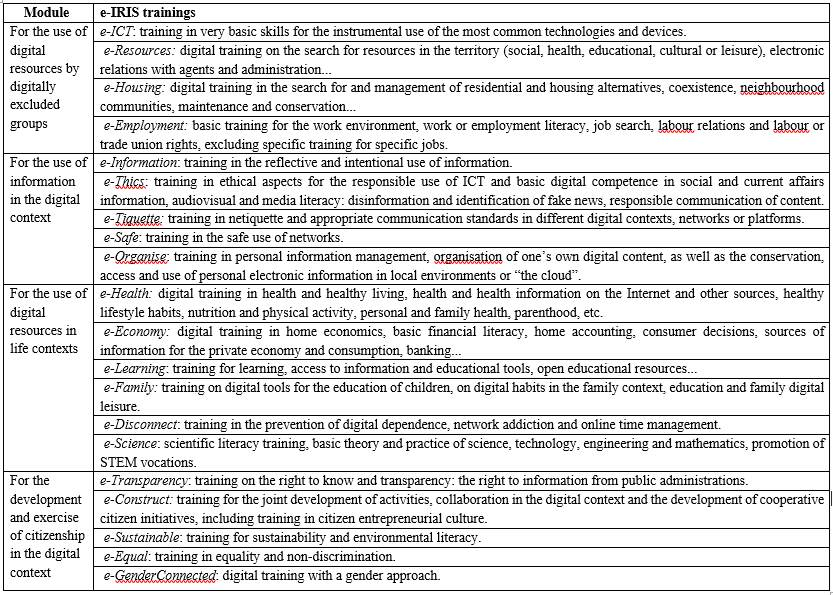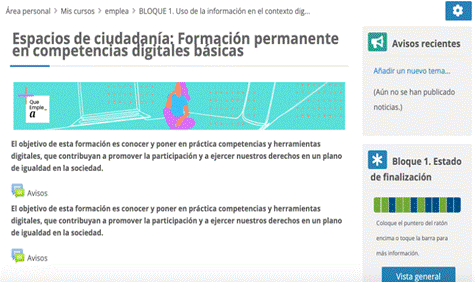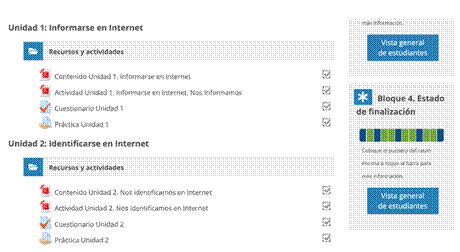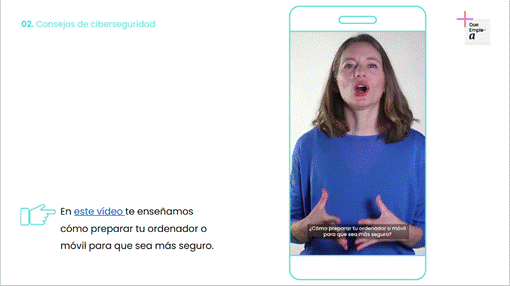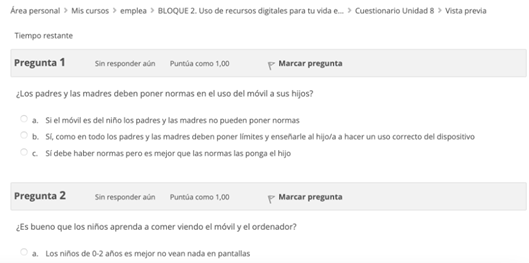Services on Demand
Journal
Article
Related links
Share
Informatio
On-line version ISSN 2301-1378
Infor vol.28 no.2 Montevideo Dec. 2023 Epub Dec 01, 2023
https://doi.org/10.35643/info.28.2.6
Articles
Design of learning content on basic digital competences for migrant women in the Region of Murcia, Spain
1 Universidad de Murcia, Campus Espinardo. Murcia, España. Correo electrónico: cgromera@um.es mavb2@um.es jgomez@um.es
2 Universitat Jaume I de Castelló. Correo electrónico: dsales@uji.es
This paper describes a content-based digital competences training programme aimed at a sample of 699 migrant women living in the Region of Murcia (Spain) who receive the Minimum Vital Income, as part of the “+que Emple-A” project financed by the Spanish Government through the Next Generation European funds granted to alleviate the consequences of the Covid 19 pandemic.
The programme design methodology is based on a comprehensive approach to digital competence according to the European Digital Competence Framework for Citizens (DigComp 2.2), from which 17 didactic units have been developed. The programme is taught with the support of an online training platform in twelve municipalities of the Region of Murcia, and particularly in their public libraries whenever possible. Based on the psycho-pedagogical model of the e-IRIS Project (Vera-Baceta & Gómez-Hernández, 2021), the contents are distributed in four areas: a) Use of information in the digital context, and basic digital tools; b) Use of digital resources in life contexts; c) Development and exercise of citizenship in the digital context; and d) Use of digital resources for digitally excluded groups. The results will be obtained through a pre- and post-test questionnaire as well as a qualitative assessment by learning mediators and the participant women.
Keywords: DIGITAL COMPETENCE; MIGRANT WOMEN; DIGITAL LITERACY; DIGITAL INCLUSION
El artículo describe un programa de contenidos de formación de competencias digitales dirigido a una muestra de 699 mujeres migrantes residentes en la región de Murcia (España) perceptoras del Ingreso Mínimo Vital, como parte del denominado Proyecto +que Emple-A, financiado por el Gobierno de España a través de los fondos europeos Next Generation, concedidos para paliar las consecuencias de la pandemia por covid-19.
El diseño del programa parte de un enfoque integral de la competencia digital según el Marco Europeo de Competencias Digitales para la Ciudadanía, DigComp 2.2, a partir del cual se han desarrollado 17 unidades didácticas, que se imparten con apoyo de una plataforma de formación online en 12 municipios de la región de Murcia, y particularmente en sus bibliotecas públicas siempre que ha sido posible. A partir del modelo psicopedagógico denominado Proyecto e-IRIS (Vera-Baceta y Gómez-Hernández, 2021), los contenidos se distribuyen en cuatro ámbitos: a) uso de la información en el contexto digital y herramientas digitales básicas; b) uso de recursos digitales en contextos de la vida; c) desarrollo y ejercicio de la ciudadanía en el contexto digital, y d) uso de recursos digitales para colectivos en exclusión digital. Los resultados se obtendrán mediante cuestionario pretest y postest, además de una valoración cualitativa por parte de mediadores y mediadoras del aprendizaje y mujeres participantes.
Palabras clave: COMPETENCIA DIGITAL; MUJERES MIGRANTES; ALFABETIZACIÓN DIGITAL; INCLUSIÓN DIGITAL
O artigo descreve um programa de conteúdos de formação em competências digitais dirigido a uma amostra de 699 mulheres migrantes residentes na Região de Múrcia (Espanha) que recebem o Rendimento Vital Mínimo (IMV), no âmbito do denominado Projeto «+que Emple-A» Financiado pelo Governo de Espanha através de fundos Europeus de Próxima Geração, concedidos para aliviar as consequências da pandemia de Covid 19.
A metodologia de concepção do programa baseia-se numa abordagem abrangente da competência digital de acordo com o Quadro Europeu DigComp 2.2 de Competências Digitais para a Cidadania, a partir do qual foram desenvolvidas 17 unidades didácticas, que são lecionadas com o apoio de uma plataforma de formação online. doze municípios da Região de Múrcia e, sempre que possível, nas suas bibliotecas públicas. Com base no modelo psicopedagógico denominado Projeto e-IRIS (Vera-Baceta y Gómez-Hernández, 2021), os conteúdos estão distribuídos em quatro áreas: a) Utilização da informação no contexto digital e ferramentas digitais básicas; b) Utilização de recursos digitais em contextos de vida; c) Desenvolvimento e exercício da cidadania no contexto digital; e d) Utilização de recursos digitais para grupos em exclusão digital. Os resultados serão obtidos por meio de questionário pré e pós-teste, além de avaliação qualitativa por mediadores de aprendizagem e mulheres participantes.
Palavras-chave: COMPETÊNCIA DIGITAL; MULHERES MIGRANTES; ALFABETIZAÇÃO DIGITAL; INCLUSÃO DIGITAL
1. Introduction
1.1 Justification and objective
The main objective of this paper is to describe a training content programme developed specifically for the improvement of basic digital competences of a group of 699 migrant women of non-EU origin, residents of the Region of Murcia (Spain), and recipients of the Minimum Living Income (in Spanish: Ingreso Mínimo Vital, IMV; acronym to be used henceforth in the paper) or Basic Income for Integration (in Spanish: Renta Básica de Inserción, RBI) in the framework of the project called "+que Emple-A". The project is focused on generating possibilities for the inclusion and personal development of the participants, based on the adaptation of the European Digital Competence Framework for Citizens DIGCOMP 2.2 (Vuorikari, Kluzer & Punie, 2022) to their literacy conditions and previous knowledge.
This is an innovative pilot project, aimed at a particularly vulnerable population group, for the development of integrated itineraries of social inclusion with the aim of contributing to the promotion of equality and the fight against poverty and exclusion. It is a project that bases its intervention on accompaniment, psychosocial care, mediation and training, subject to an evaluation of the impact of these pathways through the randomised controlled trial (RCT) methodology and the improvement of digital competence aligned with the Digital Competence Framework for Citizens DIGCOMP 2.2 (Vuorikari, Kluzer & Punie, 2022).
The women who receive the IMV have difficulties in accessing most of the basic resources and rights and do not have the tools to overcome the digital barriers they face. According to the European Anti-Poverty and Social Exclusion Network in Spain, these groups do not have or do not use email, do not have the means to connect, nor do they have support networks or someone to turn to in order to explain or guide them, therefore, they do not have the knowledge or resources to exercise citizenship in the digital context (EAPN, 2023).
The lack of basic digital competences represents a major obstacle to their participation not only in relation to employment (they are more exposed to unemployment and more precarious working conditions), but in all areas of life: health, housing, education and work. This lack of basic digital literacy is a factor, therefore, that increases the risk of exclusion, as pointed out by Raya-Díez (2007), Gómez-Hernández, Hernández-Pedreño and Romero-Sánchez, (2017) and the FOESSA Foundation (2021):
The digital divide entails a loss of opportunities in various areas such as employment, education, public administration aid and social relations. This situation of inequality leads to the perpetuation and deepening of pre-existing situations of disadvantage, but it has also been imposed as a new factor of social exclusion, even causing people and families who suffer from it to distance themselves from the possibility of full participation in society (our translation).
Given this reality, the literacy programme aimed to focus on improving the digital competence of the participants, so that they would be able to put into practice skills and tools that would facilitate the exercise of their rights on an equal footing in society.
1.2 The “+que Emple-A” Project
In 2021, the Spanish Government passed the Law establishing the IMV, an important step in the prevention of poverty and social exclusion that provides basic economic resources to cover the essential needs of the most vulnerable people. The IMV is a subjective right that forms part of the protective action of the Spanish Social Security system, and aims to guarantee a minimum level of income to those in a situation of vulnerability so that they can cover their basic needs and improve their opportunities for social and labour inclusion.
However, the IMV should be supported by other types of accompanying measures in order to become a true instrument of social inclusion. In this regard, the Ministry of Inclusion, Social Security and Migration, within the framework of the Spanish Recovery, Transformation and Resilience Plan (specifically in its 23rd Component, entitled “New public policies for a dynamic, resilient and inclusive labour market”), is funding a series of pilot initiatives that aim to identify innovative and effective accompanying measures that can eventually be transferred to stable policies after their experimental validation (Government of Spain, 2020).
Among them is the “+que Emple-A” Project, promoted by the Cepaim Foundation, with the collaboration of the University of Murcia and the Federation of Municipalities of the Region of Murcia, financed through Royal Decree 378/2022 and the Resolution of 21 September 2022 of the General Secretariat of Objectives and Policies for Inclusion and Social Welfare.
The project proposes a process of individualised social intervention that begins with a diagnosis and the elaboration of a personalised inclusion itinerary that will be followed throughout its duration. At the same time, the process is reinforced with psychosocial attention through individual and group sessions of “creating solutions”. At the same time, intercultural mediation accompaniment is provided, including linguistic, cultural and coexistence aspects. Finally, a training process is carried out to improve competences and digital inclusion.
The digital competences training process, as a fundamental part of the empowerment programme for people at risk of exclusion “+que Emple-A” and in coherence with it, has incorporated a comprehensive and critical perspective, aimed at increasing opportunities and citizen participation through digital media.
The project is currently being developed in 12 municipalities in the Region of Murcia (Alguazas, Alhama de Murcia, Cieza, Cartagena, Fuente Álamo, Lorca, Los Alcázares, Mazarrón, Murcia, San Pedro del Pinatar, Torre Pacheco, and Totana) on a total sample of 699 migrant women with different socio-demographic characteristics, although the majority are from Morocco (75%) and under 45 years of age (80%). It is coordinated by an entity specialised in the care of groups of people at risk of social exclusion, as is the case of the Cepaim Foundation. It is carried out in different municipal and youth public spaces, and especially in public libraries, as these are a reference service for society, which guarantees universal access to all people and has a maximum commitment to the right to information and the development of competences, proposing the creation of “Digital Citizenship Spaces” in them (Gómez-Hernández, 2021).
2. Theoretical framework
This programme is part of what the professional community has been considering as information literacy services. Information literacy is key to all education and training, to any educational stage and to any professional practice, and also -more and more urgently- to build an informed and ethical citizenship. Information literacy spread internationally in basic education, especially with the Big Six Skills model (Eisenberg and Berkowitz, 1990) which posits learning as problem solving, and in Higher Education through the impetus given by ACRL/ALA (1989), which described it as “competence for survival in the information age”. Years later, information literacy was also claimed as a “basic human right in the digital world” (IFLA, 2005), among various statements on its importance (UNESCO, 2020).
From an information literacy perspective, the key lies in educating critical thinking, and today it is conceived from an integrative perspective, in relation to digital literacy and media literacy, as has been highlighted for years by UNESCO (2013, 2021), together with recent initiatives such as MILA (2023), to foster a multiple literacy (with information literacy as the axis) in an integrated and holistic manner in the digital society, and highlighting its backbone role in the configuration of a citizenship based on values of equality and democracy. In this conceptualisation, we consider the current definition of CILIP (2018) to be of reference:
Information literacy is the ability to think critically and make balanced judgements about any information we find and use. It empowers us as citizens to reach and express informed views and to engage fully with society. (...) Information literacy incorporates a set of skills and abilities which everyone needs to undertake information-related tasks; for instance, how to discover, access, interpret, analyse, manage, create, communicate, store and share information. (...) Information literacy is associated and overlaps with other literacies, including specifically digital literacy, academic literacy and media literacy. It is not a stand-alone concept, and is aligned with other areas of knowledge and understanding.
In its full version (CILIP, 2018), this definition rightly situates information literacy in five contexts essential to the lives of all people: everyday life, citizenship, education, the workplace and health. It emphasises that the information literacy that lies at the heart of lifelong learning is of real value in all circumstances, that is, for everyone and throughout life. This perspective converges with that of the DIGCOMP Framework, which focuses on digital competence, with the information dimension as the first area of an inclusive competence framework for citizenship education.
In the “+que Emple-A” Project, the starting point of the content programme is the concept of digital competence understood as a set of knowledge, skills and attitudes that enable the application of technologies to personal and community needs in a critical, reflective and intentional way. It is a constantly evolving competence, which can be mastered gradually (basic, intermediate, advanced and highly specialised), and which should be applied in a contextualised way. We can speak of a digital competence in the professional field in which we work or of a teaching and scientific digital competence, aimed at teaching or research, but in this case we are referring to a digital citizenship competence: the one that all of us require to solve our needs in our daily lives and as members of a community. In the programme, the design of contents was oriented towards this last dimension of the digital competence, for its application in the different facets of personal and community life, and aspiring to the B1 level of proficiency, which is the first level at which it can be used with autonomy according to the DIGCOMP 2.2 Framework which underpins the project.
The DIGCOMP Framework is an initiative developed by the European Commission that addresses the growing need for digital competences in society, introduced in 2013 (Ferrari, Punie and Brečko, 2013) as part of the “eSkills for Jobs” project, after having included these skills among the eight basic competences of European citizenship (Council of the European Union, 2006). In the European educational sphere -and specifically in Spain, where our project is being developed- DIGCOMP is the reference framework most commonly used in the programmes for learning this competence in the formal educational system. It provides a transferable, adaptable and scalable model from a holistic perspective around the knowledge, skills and attitudes required for digital competence.
The DIGCOMP establishes five basic dimensions (information, communication, content creation, security and problem solving) that integrate a total of 21 sub-competences for a comprehensive digital competence:
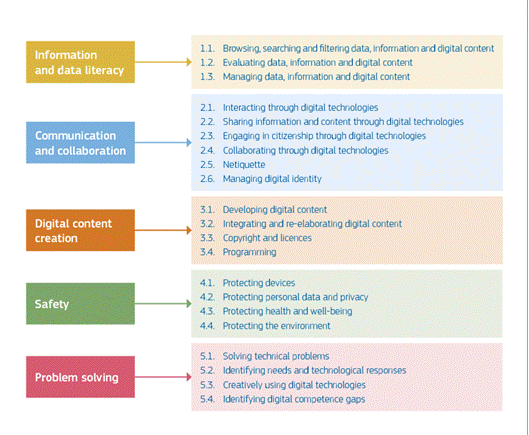
Figure 1: Competence areas according to the DIGCOMP 2.2 Framework (Vuorikari, Kluzer & Punie, 2022. Taken from: https://joint-research-centre.ec.europa.eu/digcomp_en )
3. Methodology
3.1 Adapting the e-IRIS Project’s e-Citizenship Programme
For the development of the “+que Emple-A” programme, the content structure proposed within the framework of the e-IRIS initiative and the “Digital Citizenship Spaces” methodology has been taken as a reference. The initiative, promoted by a group of entities including the University of Murcia, Cepaim Foundation, the Spanish Federation of Archives, Libraries, Documentation and Museum Societies (FESABID) and the Spanish Federation of Municipalities and Provinces (FEMP), visualises the Spanish network of public libraries as a means for the construction of citizenship in which a fundamental element is digital training and the so-called “e-Citizenship” (Gómez-Hernández & Vera-Baceta, 2021; Vera-Baceta & Gómez-Hernández, 2021). These trainings are combined with other types of actions (e-Inclusion: Individual guidance and care services for people at risk of social and digital exclusion to respond to their specific needs; e-Connect: Meeting spaces to promote social inclusion and cohesion through discussion forums, talks, reading workshops, storytelling, theatre, exhibitions or competitions that allow the interaction of different social groups, and e-Innovate, spaces for artistic creation and social and cultural innovation), whose structure is shown in the table below:
3.2 Principles of methodological design of training units
a) Adaptation to the level of prior knowledge of the participants, both in terms of digital competence and their level of basic literacy in Spanish. To this end, the contents have been subject to audiovisual and graphic adaptation to improve their usability and comprehension by a team specialised in the design of learning materials.
b) Link with the real needs of the participants’ daily lives, assuming a holistic and critical perspective of information literacy that connects training with personal needs, innovation and citizen participation.
c) A meaningful, contextualised and cooperative active learning approach, which promotes communities of practice, working groups or informal networks with which to tackle practical problems in a collaborative and creative way for a dynamic, active, reflective, critical, co-responsible and shared acquisition of competences.
4. Results
The programme designed, based on the selection of the contents considered most necessary for the personal and social empowerment of the participating women, includes different activities related to the use and management of information, structured in the following four areas:
-Use of information in the digital context and basic digital tools;
-Use of digital resources for socially excluded groups;
-Use of digital resources in life contexts: Internet and personal development;
-Development and exercise of citizenship in the digital context.
Aspects ranging from the fight against the digital divide, access to and use of electronic devices, to issues more closely linked to full participation as citizens in the territory of which they form part, are addressed. Specifically, the first module related to the “Use of information in the digital context. Basic digital tools” deals with training on the value of being informed and making responsible, critical and safe use of information in an increasingly digital world. The second module focuses on the “Use of digital resources for socially excluded groups. Useful tools for your life in Spain” in contexts such as health, family, social services, work or housing. The third module, on the “Use of digital resources in life contexts: Internet and personal development”, provides training in different technological tools to, for example, learn how to create a curriculum, develop online training to continue learning, use of mobile banking or aspects related to digital disconnection. And, to conclude, a final module on “Citizen development and exercise in the digital context. Applications to simplify your daily life” deals with contents and activities related to the handling and management of digital documents, social media or issues of collaborative economy and citizen participation. The following table shows the final contents taught (Table 2).
Table 2: Contents of the Digital Training “+QueEmplea”.
| Module 1. Use of information in the digital context. Basic digital tools |
|---|
| Unit 1. Getting information on the Internet Information on the Internet Why is information important? Information search engines The media TV, radio and print media Digital (on the Internet) Beware of misinformation We put into practice |
| Unit 2. Identifying yourself on the Internet Digital identification What is digital identification for? Types of digital identification Digital certificate Cl@ve System We put into practice |
| Unit 3. Writing appropriately in the digital context Before writing On which channel or medium do you write? How to create an email account Who do you write to? We put into practice |
| Unit 4. Dealing safely in the digital context What is cybersecurity? Cybersecurity tips Internet scams Protect yourself from hackers Keep an eye on your mobile phone We put into practice |
| Module 2. Useful digital tools for socially excluded groups |
| Unit 5. Housing Search for a house What do they ask you to rent a house? What rights do you have? Register where you live Some aids We put into practice |
| Unit 6. Health Health on the Internet The Spanish health system The health card The health system in Murcia We put into practice |
| Unit 7. Social services and public safety Learn about social protection in Spain The front door. Social services Murcia Institute of Social Action (Instituto Murciano de Acción Social, IMAS) State aid Aid for children and adolescents Aid for women Social Entities Consulates Citizen Security We put into practice |
| Unit 8. Family Mobile phones and children Parental control applications Talk to the school We put into practice |
| Unit 9. Work The world of work in Spain What to do if you don’t have a job? Unemployment We put into practice |
| Module 3: Use of digital resources in life contexts: Internet and personal development |
| Unit 10. Making a CV How to make a good CV Tools to make your CV Templates to make a good CV Tailor your CV to the job you are applying for We put into practice |
| Unit 11. Internet training Training to improve your chances Internet training We put into practice |
| Unit 12. Mobile banking Get to know mobile banking What do I use mobile banking for? Open a bank account Pay with Bizum App to make your tax return We put into practice |
| Unit 13. Digital disconnection What is digital disconnection? How do you use technology? Tips for healthy digital consumption We put into practice |
| Module 4: Development and exercise of citizenship in the digital context |
| Unit 14. Working with digital documents Google Drive and the cloud Scan documents with your mobile Edit PDF documents We put into practice |
| Unit 15. Social media The world of social media Be careful with your publications Your privacy on social media We put into practice |
| Unit 16. Collaborative economy What is the collaborative economy? The second hand Sharing economy platforms Apps for responsible consumption We put into practice |
| Unit 17. Citizen participation and transparency Public partnerships Types of partnerships Participatory budgeting Citizen participation offices of the local councils Transparency portals We put into practice |
As can be seen in the comparative presentation (Table 3), the adaptation of contents has maintained a high correspondence with the one planned in e-IRIS and the reference to the DIGCOMP approach, but orienting itself in a more direct way to the instrumental skills identified as more basic for the target group.
Table 3: Matching of contents of the “+que Emple-A” Programme and the e-IRIS Programme
| Module | “+que Emple-A” training | e-IRIS trainings |
|---|---|---|
| Module 1: Use of information in the digital context: Basic digital tools. | Unit 1: Getting information on the Internet | e-Information e-Thics |
| Unit 2: Identifying yourself on the Internet | e-ICT | |
| Unit 3: How to write in a digital environment | e-ICT e-GenderConnected | |
| Unit 4: Cybersecurity | e-Safe | |
| Module 2: Use of digital resources for socially excluded groups: Useful tools for your life in Spain. | Unit 5: Housing | e-Housing |
| Unit 6: Health | e-Health | |
| Unit 7: Social Services and Citizen Security | e-Resources | |
| Unit 8: Family | e-Family | |
| Unit 9: Work | e-Employment | |
| Module 3: Use of digital resources in life contexts: Internet and personal development. | Unit 10: Making a CV | e-Employment |
| Unit 11: Online training | e-Learning | |
| Unit 12: Mobile banking | e-Economy | |
| Unit 13: Digital disconnection | e-Disconnect | |
| Module 4: Citizen development and exercise in the digital context: Applications to simplify your daily life. | Unit 14: Working with digital documents | e-Organise |
| Unit 15: Social Media | e-ICT | |
| Unit 16: Collaborative Economy | e-Economy e-Sustainable | |
| Unit 17: Citizen participation | e-Construct e-Equal e-Transparency |
The development of the teaching is based on micro learning units (videos, presentations or infographics) with a simple, visual and basic design, with different levels of understanding adapted to the level of the participating women. In addition to these contents, “meeting spaces” are planned in which work will be carried out, both in person and online, on issues such as citizen participation, stereotypes, the construction of alternatives to discourses or messages of hate or knowledge of local history and historical memory, through various sources such as archives and digital libraries.
For the delivery of the programme, a group of educators has been selected, who have been immersed in the contents of the programme and have received specific training for its teaching-learning. After that, they have started the training with the target group of women, supported by a technological platform in which the contents and learning actions are managed, the initial and final diagnoses of the participants are carried out, as well as the monitoring of the results in the different lines of action, so that the economic resources contributed to the project by the financing entities can be validated and justified. This platform, which centralises the educational content, will also serve as a workspace for mediators in the literacy process, and can be an open knowledge portal on the contents of the programme (Guerrero-Romera et al., 2021).
The training activities begin with explanatory videos, followed by a series of brief conceptual contents on the competence to be developed, and some practical exercises to be carried out, supported by guidelines that set out the steps of the tasks. Finally, each unit includes a multiple-choice questionnaire to be answered through the learning platform. The following images show some views of the training on the platform.
As for the results, although they are not yet available as this is an ongoing research, they are expected to be obtained from an evaluation based on a pre-test and a post-test questionnaire, as well as a qualitative assessment through the analysis of the experience by those who have taught the programme and the participating women, who are undoubtedly the protagonists of this project. For the time being, some initial assessments can be made on the basis of informal testimonies from the participants and their trainers, which show very positive results: a high level of motivation and involvement on the part of the participants is perceived, there have been no withdrawals from the programme, and the contents have been considered adequate, although in some cases they have been considered somewhat extensive, and difficulties in understanding the terminology have been highlighted (due to the participants’ level of studies or knowledge of Spanish). For these reasons, there is also a clear need to include more visual clues to support comprehension, to use a greater number of interactive videos, and to revise the difficulty of some of the practices or tasks, reinforcing where necessary the guidance to improve the use of electronic devices.
5. Final reflections
The European Declaration 2023/C 23/01 of 23 January 2023 on Digital Rights and Principles for the Digital Decade places people and their rights at the centre of the digital transformation and focuses on improving their daily lives and building a more inclusive and healthy society, in which the intensive use of technology is also extended to all people. Our digital competences training programme aims, along these lines, to provide tools, to put public resources at the service of people for the exercise of citizenship and the improvement of well-being and quality of life. And to do so, in particular, with those in situations of vulnerability and digital exclusion in mind, to provide them with a training base that can contribute to improving their lives.
We believe that this could be a unique project in Spain and in Europe, for the validation of methodological models of inclusion complementary to the perception of the Minimum Living Income, which in this case focuses on migrant women in situations of inequality, and in which there is an intersectionality due to their double condition as women and migrants. It is a project that weaves alliances of people, spaces and resources, based on the concept of networking, shared leadership and varied wills (political, institutional, university and social), to recover women in exclusion and accompany them in their process of social inclusion and citizen participation. This may lead to a form of social innovation through the management of solidarity and inclusion, in which the territory is proposed as a space for intervention and digital education to address a triple gap: the social, the digital and the gender gap. These divides are addressed through six key elements:
1. To generate a transformative and inclusive digital learning experience for vulnerable women.
2. To implement innovative, practical, personal and personalised training, adapted to women’s needs, areas and contexts of life.
3. To support the training with the accompaniment of mediators for its development through virtual and synchronous blended learning, with individualised support and follow-up.
4. To develop training in an ecosystem of learning and evaluation of the pathways that allows the achievement of results and evidence derived from monitoring.
5. To count on the participation, collaboration and involvement of different agents and sectors and networking (community, universities, teaching and research teams, social entities, town councils, libraries, municipal services).
6. To complement the intervention with different actions: psychosocial care and support, accompaniment through intercultural mediation or community participation in the territory.
The analysis of the experience by the different agents that have participated in its development and the assessments following its implementation may provide elements for reflection and methodological tools for intervention, and for the development of digital training initiatives linked to social inclusion itineraries that contribute not only to greater access and interaction with the digital world but also to an increase in citizen involvement and participation.
We consider it essential that the mastery of digital competences is seen in government policies as a fundamental aspect for everyone. Having the skills to cope in a changing and hyper-connected digital environment is a determining factor for social inclusion and citizen participation in general, but it is especially sensitive for certain vulnerable groups that may be excluded by not providing adequate mechanisms for technology to reach them without generating a double gap, both digital and social.
Referencias bibliográficas
Association of College and Research Libraries/American Library Association (1989). Presidential Committee on Information Literacy: Final Report. http://www.ala.org/acrl/publications/whitepapers/presidential [ Links ]
CILIP Information Literacy Group (2018). CILIP Definition of Information Literacy 2018. Traducción al castellano: Sales, D. (2020). Definición de alfabetización informacional de CILIP, 2018. Anales de Documentación, 23(1). https://doi.org/10.6018/analesdoc.373811 [ Links ]
Consejo de la Unión Europea (2006). Competencias clave para el aprendizaje permanente: un marco europeo. Recomendación del Parlamento Europeo y del Consejo de 18 de diciembre de 2006. Diario Oficial de la Unión Europea L 394, 30/12/2006. https://eur-lex.europa.eu/LexUriServ/LexUriServ.do?uri=OJ:L:2006:394:0010:0018:es:PDF [ Links ]
Declaración Europea (2023/C 23/01). Sobre los Derechos y Principios Digitales para la Década Digital. Diario Oficial de la Unión Europea, C23/1, 23 de enero de 2023. https://eur-lex.europa.eu/legal-content/ES/TXT/PDF/?uri=CELEX:32023C0123(01) [ Links ]
Red Europea de Lucha contra la Pobreza y la Exclusión Social en el Estado Español (2023). El estado de la pobreza. 12º Informe anual sobre el estado de la pobreza. Seguimiento de los indicadores de la Agenda UE 2030. EAPN España. https://www.eapn.es/publicaciones/511/xii-informe-sobre-el-estado-de-la-pobreza [ Links ]
Eisenberg, M. B. y Berkowitz, R. E. (1990). Information Problem-Solving: the Big Six Skills Approach to Library y Information Skills Instruction. Ablex. [ Links ]
Ferrari, A., Punie, Y. y Brečko, B. N. (2013). DigComp: A Framework for Developing and Understanding Digital Competence in Europe. https://doi.org/10.2788/52966 [ Links ]
Fundación FOESSA (2021). Análisis y perspectivas 2021. Sociedad expulsada y derecho a ingresos. https://www.caritas.es/producto/sociedad-expulsada-derecho-a-ingresos/ [ Links ]
Gobierno de España (2020). España puede. Plan de recuperación, transformación y resiliencia. Presidencia del Gobierno. https://www.lamoncloa.gob.es/presidente/actividades/Documents/2020/07102020_PlanRecuperacion.pdf [ Links ]
Gobierno de España (2021). Plan nacional de competencias digitales. https://portal.mineco.gob.es/RecursosNoticia/mineco/prensa/noticias/2021/210127_np_digital.pdf [ Links ]
Gómez-Hernández, J.-A. (11 y 12 de noviembre de 2021). Espacios de ciudadanía digital: una necesidad y una oportunidad para el avance de la comunidad en y con la biblioteca. X Congreso Nacional de Bibliotecas Públicas. Las Palmas de Gran Canaria, España. http://eprints.rclis.org/42680/ (preprint) [ Links ]
Gómez-Hernández, J.-A., Hernández-Pedreño, M. y Romero-Sánchez, E. (2017). Social and digital empowerment of vulnerable library users of the Murcia Regional Library, Spain. Profesional de la información, 26(1), 20-33. https://doi.org/10.3145/epi.2017.ene.03 [ Links ]
Gómez-Hernández, J.-A. y Vera-Baceta, M. A. (2021). Las bibliotecas públicas españolas ante los fondos europeos de recuperación y el Plan nacional de competencias digitales. Anuario ThinkEPI, 15, 1-24. https://thinkepi.profesionaldelainformacion.com/index.php/ThinkEPI/article/view/88115 [ Links ]
Guerrero-Romera, C., Sales-Salvador, D., Gómez-Hernández, J. A., Merlo-Vega, J. A., Vera-Baceta, M. A., Cuevas-Cerveró, A. e Infante-Moro, A. (2021). Teaching basic digital competences for citizenship supported by learning platforms: the e-IRIS project. XI International Conference on Virtual Campus (JICV). IEEE, Salamanca, España (pp. 1-5). https://doi.org/10.1109/JICV53222.2021.9600373 [ Links ]
Federación Internacional de Asociaciones e Instituciones Bibliotecarias (2005). The Alexandria Proclamation on Information Literacy and Lifelong Learning. https://www.ifla.org/publications/beacons-of-the-information-society-the-alexandria-proclamation-on-information-literacy [ Links ]
Ley 19/2021 de 2021. Por la que se establece el ingreso mínimo vital. Boletín Oficial del Estado, 304. 21 de diciembre de 2021. https://www.boe.es/buscar/act.php?id=BOE-A-2021-21007 [ Links ]
MILA (2023). Media and Information Literacy Alliance. https://mila.org.uk/ [ Links ]
Raya-Díez, E. (2007). Exclusión social: indicadores para su estudio y aplicación para el trabajo social. Revista del Ministerio de Trabajo y Asuntos Sociales, 70, 155-172. https://libreriavirtual.trabajo.gob.es/libreriavirtual/descargaGratuita/W0140770 [ Links ]
Real Decreto 378/2022 de 2022. Por el que se regula la concesión directa de subvenciones del Ministerio de Inclusión, Seguridad Social y Migraciones en el ámbito de la inclusión social, por un importe de 102.036.066 euros, en el marco del Plan de Recuperación, Transformación y Resiliencia. Boletín Oficial del Estado , 118. 18 de mayo de 2022. https://www.boe.es/diario_boe/txt.php?id=BOE-A-2022-8124 [ Links ]
Secretaría General de Objetivos y Políticas de Inclusión y Previsión Social (2022). Resolución por la que se publica el Convenio con la Fundación Cepaim Acción Integral con Migrantes para la realización de un proyecto para la inclusión social en el marco del Plan de Recuperación, Transformación y Resiliencia. Boletín Oficial del Estado , 236. 21 de septiembre de 2022. https://www.boe.es/diario_boe/txt.php?id=BOE-A-2022-16014 [ Links ]
Unesco (2013). Media and Information Literacy: Policy and Strategy Guidelines. Unesco. [ Links ]
Unesco (2021). Media and Information Literate Citizens. Think Critically, Click Wisely! Media y Information Literacy Curriculum for Educators y Learners. Unesco. [ Links ]
Vera-Baceta, M.-Á. y Gómez-Hernández, J.-A. (2021). «Espacios de ciudadanía digital» en las bibliotecas públicas: una propuesta para su integración en el marco delPlan nacional de competencias digitales Anuario ThinkEPI, 15. https://doi.org/10.3145/thinkepi.2021.e15b02 [ Links ]
Vuorikari, R., Kluzer, S. y Punie, Y. (2022). DigComp 2.2: Marco de Competencias Digitales para la Ciudadanía, con nuevos ejemplos de conocimientos, habilidades y actitudes. Versión española: Asociación Somos Digital https://somos-digital.org/digcomp/ [ Links ]
Author contribution note: The authors state that their contributions have been the following: 1. Conceptualization: Miguel Ángel Vera and Catalina Guerrero 2. Project financing management: Miguel Ángel Vera and Catalina Guerrero 3. Project administration: Miguel Ángel Vera and José A. Gómez 4. Design of the methodology: Miguel Ángel Vera, Dora Sales and José A. Gómez 5. Obtaining results and discussion: Dora Sales, Catalina Guerrero, José A. Gómez and Catalina Guerrero 6. Writing of the text: José A. Gómez, Dora Sales and Catalina Guerrero 7. Supervision: Miguel Ángel Vera, Dora Sales and José A. Gómez 8. Validation of results and writing of conclusions: Catalina Guerrero, Dora Sales and José A. Gómez 9. Revisions requested in the evaluation: José A. Gómez, Dora Sales and Catalina Guerrero 10. Reference Writing: Catalina Guerrero and Miguel A. Vera 11. English version of the article: Dora Sales.
Received: July 27, 2023; Accepted: September 04, 2023











 text in
text in 


